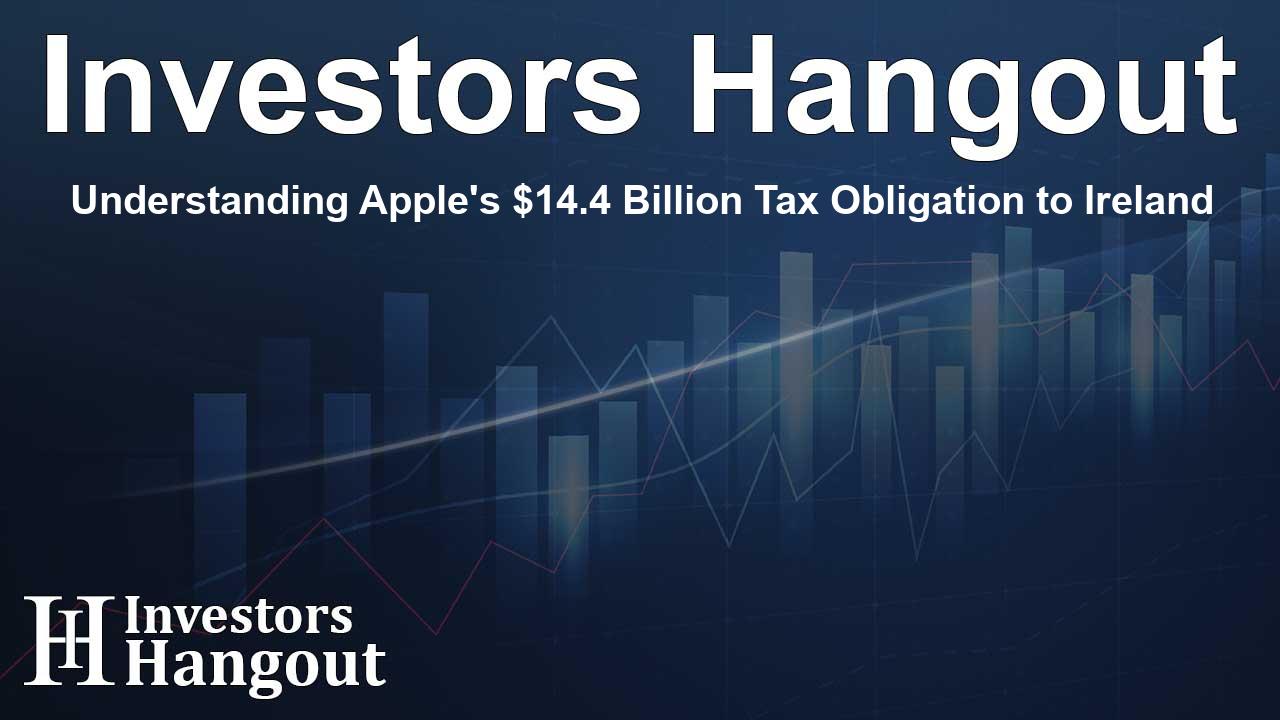Understanding Apple's $14.4 Billion Tax Obligation to Ireland

Overview of Apple's Tax Obligation
Apple (NASDAQ: AAPL) is currently embroiled in a major tax dispute, which has resulted in a staggering obligation of 13 billion euros (around $14.4 billion) to Ireland. This landmark ruling stems from a lengthy legal battle with the European Union, which has been examining the 'sweetheart deals' that are often provided to large corporations.
The Basis of the Legal Battle
In 2016, Margrethe Vestager, the European Commission's competition chief, accused Ireland of granting illegal tax advantages to Apple. The European Union argued that this practice enabled Apple to shift profits away from taxation in other countries, thereby undermining fair competition.
The EU's Position
Despite some initial legal victories, both Apple and Ireland faced setbacks as the European Court of Justice ultimately supported the EU's position. This ruling highlighted how Apple was able to take advantage of loopholes in Ireland's tax system, resulting in a demand for significant back payments to the Irish government.
Understanding the 'Double Irish' Tax Scheme
The situation is further complicated by a financial arrangement known as the 'Double Irish.' This strategy was a key factor in attracting major tech companies to Ireland, allowing multinationals to drastically lower their tax obligations through complex corporate structures.
Mechanics of the 'Double Irish'
Through this framework, multinational corporations would shift untaxed income to an Irish subsidiary. Eventually, those funds would be transferred to another company registered in Ireland, but then moved to a location with a more favorable tax rate, such as Bermuda. Although Apple utilized this strategy until around 2014, increasing pressure from both the EU and the U.S. ultimately led to the closure of this tax loophole.
Apple's Response to the Ruling
Apple has expressed its dissatisfaction with the court's final ruling, which cannot be appealed. The company contends that the European Commission's attempt to retroactively change tax regulations violates international tax law, asserting that their revenue had already been taxed in the U.S.
Future Impacts on Ireland
It remains unclear how Ireland plans to allocate the funds received from Apple. While the Irish government has not outlined any immediate intentions, it is possible that these funds could support a newly established sovereign wealth fund. This initiative aims to manage the influx of corporate tax revenue, contributing to Ireland's rare budget surplus among European nations.
Anticipations for Other Corporations
This ruling could set a significant precedent for evaluating the tax strategies of other multinational corporations. The investigation into Ireland's agreement with Apple revealed candid discussions among Irish officials regarding the tax benefits provided.
Other Corporate Cases
For example, Amazon (NASDAQ: AMZN) faced scrutiny over its tax practices in Luxembourg but successfully defended itself against a large back-tax order last year. In contrast, Starbucks (NASDAQ: SBUX) also won its case against an EU demand related to Dutch taxes.
In conclusion, Apple's case against the EU not only raises important questions about corporate taxation practices but also marks a significant shift in global tax regulatory frameworks, altering how multinational companies operate and report their earnings internationally.
Frequently Asked Questions
What led to Apple’s tax payment to Ireland?
Apple is required to pay back taxes to Ireland following a ruling by the European Court of Justice, which found that the company benefitted from illegal tax benefits.
What is the 'Double Irish' tax scheme?
The 'Double Irish' is a tax strategy allowing multinationals to shift profits into Irish subsidiaries to minimize tax liabilities.
How did the European Commission respond to Apple's practices?
The European Commission initiated an investigation that led to the conclusion that Apple had received unfair tax benefits, resulting in the back tax order.
What does this ruling mean for other companies?
This decision could influence investigations into tax arrangements of other multinationals, potentially leading to similar obligations for them.
How might Ireland use the funds from Apple?
The funds may be allocated to a new sovereign wealth fund or used to enhance public services amid rising corporate tax revenues.
About The Author
Contact Olivia Taylor privately here. Or send an email with ATTN: Olivia Taylor as the subject to contact@investorshangout.com.
About Investors Hangout
Investors Hangout is a leading online stock forum for financial discussion and learning, offering a wide range of free tools and resources. It draws in traders of all levels, who exchange market knowledge, investigate trading tactics, and keep an eye on industry developments in real time. Featuring financial articles, stock message boards, quotes, charts, company profiles, and live news updates. Through cooperative learning and a wealth of informational resources, it helps users from novices creating their first portfolios to experts honing their techniques. Join Investors Hangout today: https://investorshangout.com/
The content of this article is based on factual, publicly available information and does not represent legal, financial, or investment advice. Investors Hangout does not offer financial advice, and the author is not a licensed financial advisor. Consult a qualified advisor before making any financial or investment decisions based on this article. This article should not be considered advice to purchase, sell, or hold any securities or other investments. If any of the material provided here is inaccurate, please contact us for corrections.
